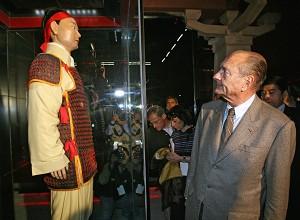XIAN, China (Reuters)—During a four-day state visit to China, French President Jacques Chirac pored over relics in the first imperial capital of a country which has opened its culture and huge market potential to the West. The French leader, whose back-slapping electoral style in domestic politics belies a specialist knowledge of Oriental culture, delighted his hosts in the city of Xian with his attention to detail and knowledge of China’s ancient roots.
Mr. Chirac even abandoned protocol to give his entourage a spontaneous lecture on the Western Han dynasty, whose way of life 2,000 years ago peeps through semi-excavated soil in rows of figurines and everyday objects laid out like an open book. “Journalists! Come over here, there’s something interesting!” Chirac called out in the dark mausoleum, waving aside his security guards.
“You are a great friend of the Chinese people and of our civilization,” archeology professor Han Wei told Chirac. Xian, in Shaanxi province, stands more or less on the site of the ancient city of Chang'an (“Perpetual Peace”), which served as capital to emperors of the Han, Sui and Tang dynasties. The modern city is known worldwide for its Terracotta Army—6,000 preserved figures of warriors and horses defending a nearby imperial necropolis, one of China’s main tourist attractions. Chirac, who first visited Xian in 1978 when mayor of Paris, packed reporters off to see the famous vaults while opting instead for a private visit to the city’s archaeological museum to see never-before-exhibited bronze discoveries from 2,800 BC. The mausoleum for Emperor Liu Qi, who died in 141 BC, took 26 years to build and is a three-dimensional document of his life.
Experts say Chirac’s interest is not just for public show. Indeed until quite recently, his devotion to ancient Japanese and Chinese history springing from his teens was kept hidden. “He is a real connoisseur,” said Christian Deydier, president of the French antique dealers’ association. “If I had to rank him among experts in France on Chinese art and history, I would put him among the top five.”
Chirac, whose second term expires in May 2007, had arrived on his fourth and possibly last presidential visit to China stressing the importance of history to the Chinese. “There are those who say China has no book to define itself, no Bible or Koran. They are wrong. History is their book. To understand China you must grasp its history,” he told reporters. Chirac was due to leave Xian for Paris after visiting first Beijing and then the central city of Wuhan, where he hailed deepening Sino-French economic and political ties in the first visit there by a Western head of state. He was received with full pomp in Wuhan which had not seen a major foreign leader since Romania’s Nicolae Ceausescu some 25 years ago. China had then barely begun the market reforms which have lured French car firm PSA Peugeot Citroen there.
The formal part of Chirac’s visit, beginning with talks with President Hu Jintao in Beijing, was dominated by hard-nosed business talks as well as by discussions on Iran and North Korea.
The result for French businesses was both sweet and sour—a $10 billion plane order and a deal to build an Airbus factory in China, but no visible progress on a strategic nuclear energy deal being fought over between France and Washington.





